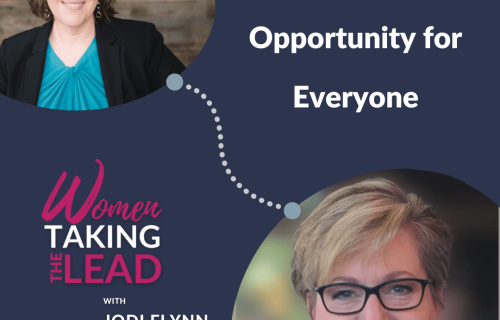
100% Jodi: Who are your free helpers?
Click the play button to listen to the podcast episode.
For your career, who do you go to for help and support?
Help comes in many forms and from various sources. Some help you can get for free and some will cost money.
I recommend utilizing free resources when appropriate and for as many things as you can. And, it’s important to know that free resources may only get you so far depending on what your goals and challenges are.
I’ve seen many women get stuck in their career or with a situation at work because they keep going back to the people in their life who will offer their help for free, but who don’t have the expertise to guide this woman through her challenge effectively.
Knowing whom you can go to for what will save you time and energy, and not put any undue pressure on those in your support system who want to help but can’t give you what you need.
This episode will cover the types of help you can receive in your career for free, and how to utilize those people – your free helpers!
Hello!
If you are new to the Women Taking the Lead podcast…hello and welcome!
I’m Jodi Flynn. I’m an executive leadership coach, speaker, and author. I am the current President of the board for The Maine Women’s Conference. I have the privilege and joy to work with women leaders to hone the skills that allow them to grow into and then thrive in Senior Leadership. My specialization is working with women who are still stabilizing after their last promotion and those who are preparing for the next one.
It is my belief, that for more women to hold positions of senior leadership, there are changes at the individual and organizational level that need to occur. Not only do women need to be trained and coached on how to operate at these levels of leadership, organizations need to change their paradigm of how the work gets done and what supports are in place for leaders to do their job.
If we are not already connected on LinkedIn, please send me an invitation to connect. You can find me directly at linkedin.com/in/jodiflynn, or you can search for Jodi Flynn. I’m very active on LinkedIn so I should be at or near the top of the search results. You’ll see the Follow button is prominent on my profile but if you click on the More button to the right, you’ll find the option to Connect. Click on that and be sure to add a note to the invitation letting me know you are a listener of the podcast. I would love to connect with you and get to know you better.
Free Helpers in Your Personal Life
The first two helpers I’m going to cover are relationships in your personal life but the people in these capacities can be very helpful to you when you are facing challenges at work.
Family
Your family is likely a big part of your support system and it’s okay if they are not. Everyone’s family is different and different dynamics play out in every family. If family is a part of your support system, they can give you the emotional support and unconditional love you need to get through many challenging situations.
I know for me, just knowing my family will be there if ever I need them, gives me a confidence that I often take for granted in that I don’t think or worry about it. It’s just there, and if you have this you know it’s amazing.
The thing with family is, they often get stuck seeing you through the eyes of family. If it’s an older family member they may not be able to get past seeing you as much younger than you currently are, and may not realize how competent and capable you are.
Family also tends to have their own ideas of what they think is best for you, how they want you to fit into their life, and are usually happy to tell you what you should do. Our families want us to be safe, happy and healthy. And they usually have a notion of what you need to do be safe, happy and healthy that may not mesh with your personality and preference, or how you want to live your life.
Also, most of our families could not accurately tell another person what it is we do for work. Have you ever heard your family describe what you do to another person?
What you need to understand about your family is their function is to love you unconditionally and it doesn’t truly matter to them what’s going on for you at work as long as you are doing well. When you try to lean on family too much for support in your work life the wires can get crossed and you and your family member may be left feeling frustrated.
Given all of this, family tends to be great to go to for unconditional love and cheerleading, but may not have the best perspective to help you navigate all your career challenges.
Friends
Friends are priceless. Your friends want the best for you no matter what is going on in their own life. They are on your side and sometimes loyal to a fault.
These are the people you can say anything to. You share interests so they are your companions in exploring the world and who you are in the world. They are your shoulder to cry on and they are literally or figuratively jumping up and down with you when there’s something to celebrate.
Because they are not caught up in a family identity, friends have more space for you to explore who you want to be in the world, within limits. A mature friendship is not only based on shared interests, but shared values.
You may notice that you drift away from friendships when it becomes apparent that you don’t hold the same core things as important. You’ll also quickly become friends with those who do share your highest values.
Because of your shared values, interests and world view, you can bring all your work drama and challenges to your friends. As a pair or a group, you can dissect the situation and come up with perspectives, theories, and strategies for handling a work situation.
However, friends may have a hard time remaining objective and trying to see things from the point of view of all the parties involved in your work challenge. They can absolutely offer their perspective which can be helpful, but they will only be able to offer further assistance to level that they are trained or have expertise in the area your needing help.
Also, friends may be hesitant to point out where you are contributing to the challenge. They may worry that they’ll hurt your feelings, or fear you’ll bring that type of critique to their challenges.
We are often accepting of others behavior to the extent that we don’t want to be called out on our own behavior. We may not want to point out to a friend that they are being too demanding or rigid for fear they’ll call us out when we are being too demanding or rigid.
We are constantly writing and rewriting the unspoken rules in our friendships.
If you are blessed with a friend who is a great listener, can remain objective when you are talking about your challenges, can be kindly honest with you, and has expertise in the area you are looking for help, wonderful. If your friend lacks any or all of those attributes, I’m sure they’ll do what they can to help you because they love you, but they may not be able to give you everything you need.
Would you like some coaching for free?
There’s so much that can be gained by listening to what another woman is going through, and to understanding the strategy she will implement to overcome any challenges she is faced with. For this reason, I would like to begin recording and releasing On-Air Coaching Calls on this podcast.
If you are a women leader who has been promoted or taken on a new role in the last year, I invite you to apply to be on the Women Taking the Lead podcast. You will be completely anonymous so you won’t need to worry about anyone you work with listening to you talk about your challenges.
This is an opportunity for you to get insights and strategies to overcome any challenges you’ve been faced with at work. And, the other women listening to your episode will learn from your experience and gain insights that they can use at work.
You can find the link that will take you to the application in the episode description in your podcast app or at the bottom of the episode page on the Women Taking the Lead website.
Free Helpers in Your Professional Life
The next two free helpers are mentors and sponsors, and both focus on your professional development.
Mentors
A mentor is a more senior or a higher performing person who can convey information about their own career path, as well as provide guidance, motivation, and emotional support.
The purpose of mentoring is to transfer existing knowledge, skills, experience, and sometimes the contacts, of the mentor to quickly advance your skills, business acumen, and network. A mentor may help with exploring careers, setting goals, networking, and identifying resources.
It’s great to have a role model who has ‘been there and done that’ and will show you the way. And for many people in the later stages of their career, they have a yearning to pass on their knowledge and know-how to those who are coming up behind them. They gain a lot of satisfaction and esteem from this role so there is a benefit to them. It’s a reciprocal relationship.
Personally, I’ve never had a formal mentor, but there were many people who unofficially took on this role with me. And that leads me to say, you don’t have to necessarily announce this relationship and call it what it is. If there is someone with more experience that you reach out to regularly to get their perspective and guidance, they are acting as your mentor.
If you are looking for someone to commit to this role, and be willing to commit to opening up to you about their experiences on a regular and consistent basis, then you’ll want to ask the other person if they are open to mentoring you.
Some companies even have programs to match their high potential employees with a mentor. These programs usually have mixed results because there needs to be a certain chemistry between a mentor and their mentee/protégé. Mutual respect, trust and caring are needed to make this relationship work.
Additionally, you want to choose a mentor who has gone where you want to go so to speak. If you want mentoring on how to be a CFO someday, you want to talk to someone who is or has been a CFO. You want to start a non-profit? You’re looking for a mentor who has done that.
A bit of wisdom that floats around entrepreneurial circles is to only take advice from someone who has done what you want to do. That person could be your mentor.
While a mentor can share their own personal experience, introduce you to their network, and give you guidance and emotional support, they may not have the ability to help you explore strategies and paths that they have not taken themselves.
The path they took to get where they are may not work for you. The current workplace environment may look different from when they were at your stage in their career.
Also, if you are a woman of color, LGBTQ, or have a disability, etc., and your mentor is not, they may not be able to guide you through some specific challenges that you are having because they didn’t have that experience and may be unaware of all the dynamics involved.
Overall, mentors are amazing and hugely helpful in your career. You just need to be aware of any possible limitations and again, not put undue burdens on your mentor.
Sponsors as Free Helpers
A sponsor is a person in your workplace who has authority or influence they can use to help you in your career development or advancement.
I’m thinking of the song from Hamilton, The Room Where It Happens, which is one of my favorite songs from that show. The sponsor is the person “in the room where it happens” who can open up opportunities for you.
They are usually at the executive level in an organization and have the sway to get you a hand up to a higher level in the company.
The sponsorship relationship can include talking to you about job opportunities you may not have thought of or knew about, nominating you for projects, and advocating for you to other senior leaders or decision-makers.
This may seem to you like it’s a one-way relationship but sponsors do have a stake in the game. They may be looking for someone who can impact a particular team or project and have an effect on the company revenues.
And if a sponsor advocates for you and you meet or exceed all expectations on that particular project or in that particular role, they gain more esteem and trust from their peers or leaders which pays off in their own career.
In this relationship your performance reflects on the sponsor so keep that in mind. They are staking their reputation on you. If you look good, they look good and the benefits of that can continue to come your way.
Sponsorships are especially beneficial to women and people of color, who typically struggle with advancement. Having someone in your corner who is intentionally and actively bringing you to the attention of decision-makers, increases your odds of being selected for key projects and promotions.
The best way to find a sponsor is to build a solid reputation at your company. Sponsors will seek out high potential employees who show initiative, hard work, and determination to succeed. Show that you’re a high performer by asking to be on projects that showcase your strongest skills. Volunteering for additional roles, such as getting involved with an Employee Resource Group, can also help to bring you to the attention of potential sponsors. It’s important to stand out from your co-workers.
Okay, sponsors are clutch, and if your goal is advancement, sponsors are a great support that doesn’t cost you any money.
Keep in mind, this relationship is limited because your sponsor may not be available to help you with all of your challenges. Some challenges, maybe, if your challenge is getting in the way of their goals as well. Then they might be willing to offer additional assistance.
For the most part, though, a sponsor assumes you are actively developing yourself as a leader and getting the support you need for that elsewhere.
Whether you seek out a mentor, a sponsor, or both depends on the goals you have and the challenges you are facing.
In next weeks’ episode I’ll be covering who your paid helpers are because sometimes, the help you need is not the kind of help your free helpers can provide for you.
Let’s Chat!
If you’re interested in finding out more about my process, the cost of coaching, or how to ask your employer to pay for you to work with a coach, schedule a time to chat with me.
You can also access the checklist that will help you prepare to ask your company to sponsor you to work with a coach. https://womentakingthelead.com/checklist
As always, I hope this was of value to you and here’s to your success!
Resources
Apply to be on an “On-Air Coaching” episode: Are you a female leader who has been promoted in the last year? You are invited to apply to be on the podcast.
Checklist to Ask Your Company for Coaching: Would coaching help you become a stronger leader? Wondering if your company would pay? It doesn’t hurt to ask!
Leadership Coaching: If you interested in finding out more about my coaching process, the cost of coaching, or how to ask your employer to pay for you to work with a coach, schedule a call with me.
Accomplished: How to Go from Dreaming to Doing: The book containing a simple, step by step system that gives you the foundation and structure to take your goals and make them happen.
The Women Taking the Lead Podcast
If you enjoyed this episode, follow in Apple Podcasts, Spotify, Google Podcasts, iHeart Radio, Stitcher Radio, Amazon Music or Pandora and never miss out!


